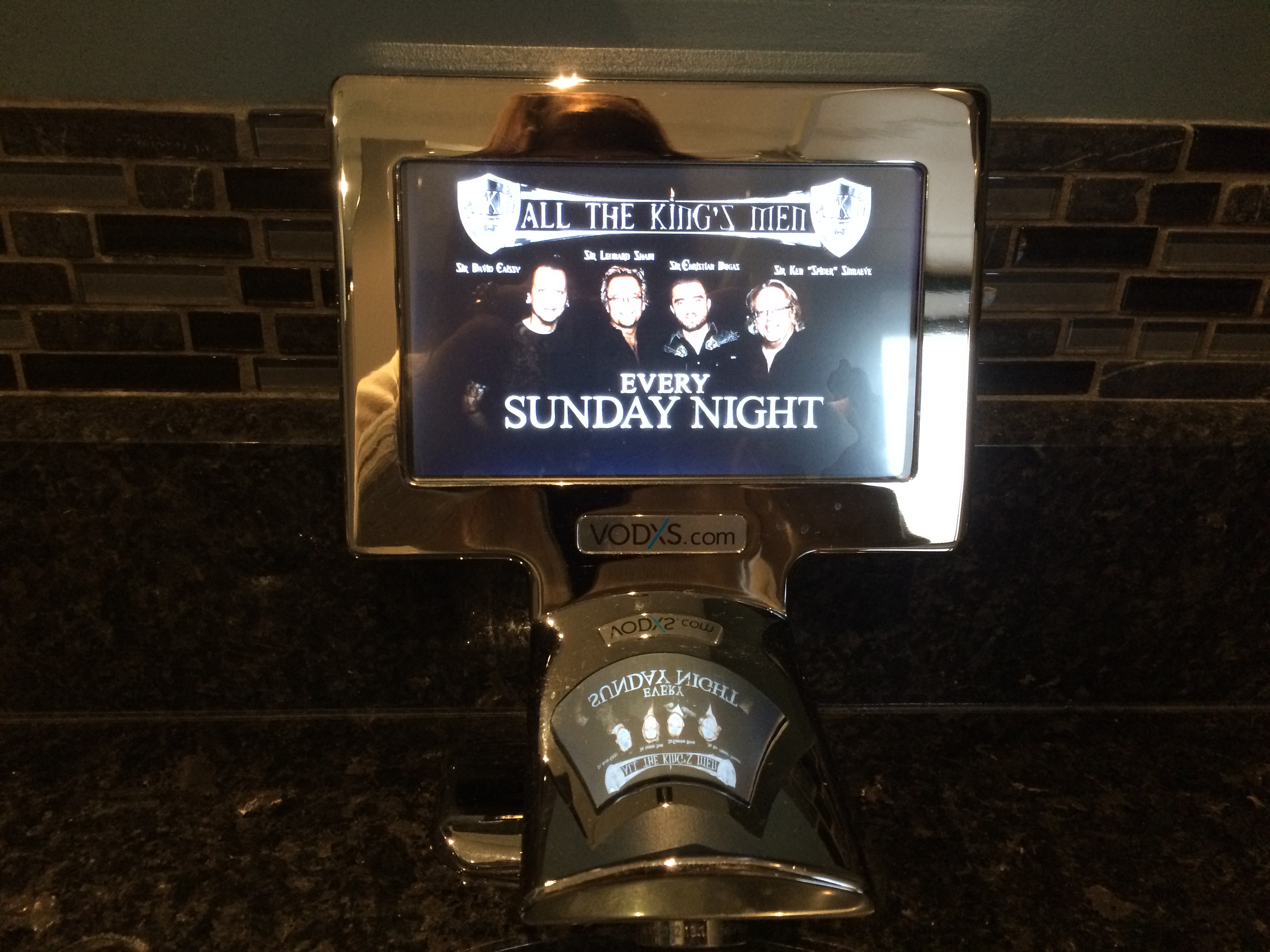Tagged: Politics
Today in "Things That Surprised Nobody"
- by Alyson Shane
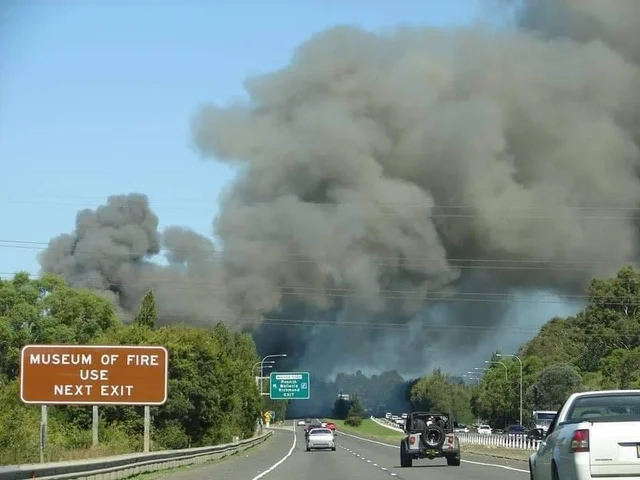
Everything is horrible including the weather, my mood, the world, and politics.
Donald Trump signed an executive order that could obliterate free speech on the internet.
I wish this wasn't surprising but I've actually been worrying about something like this for a long time. Twitter refused to censor him for so long, and now it's too little too late and I'm scared of where this is going. Stay tuned I guess.
Premier Brian Pallister, who recently lashed out at universities and said their staff have an "ivory tower" attitude, is the least popular premier in Canada.
Can we just vote this guy out of office already? Manitoba deserves a million times better than this goon.
I could probably say something critical about Justin Trudeau now but for the most part I haven't been annoyed with him so maybe I'll just picture him dong that hair flip and
DAMN IT
I just remembered that the 10 day sick leave policy the Liberals are getting credit for pushing for was actually an issue the NDP were fighting for and negotiated for.
Don't get me wrong: I'm happy to see the policy being put forward, but it'd be nice if the media gave Singh and the party more credit for all they've been doing to help Canadians during the pandemic. John called the NDP "the Unofficial Opposition" the other day and that's basically what;s going on, because I keep waiting for Andrew Sheer to say something of value and
big surprise
he never does.
But what should I expect from someone who lied about being an insurance broker
(I guess it sounds sexier than "worked as an insurance clerk, waiter, and in the office of an MP")
and spends most of his time criticizing what other people are doing instead of coming up with innovative solutions himself.
Politicians like that are the worst.
Are all politicians the worst?
Maybe not. I don't think so.
I don't think people like Bernie or Obama or AOC or Jugmeet Singh or Jack Layton or the (late, great) Winnipeg City Council Member Harvey Smith got into this racket
I think they got into it to do some good, and I wish we'd see more of that.
Jack Layton died 8 years ago today
- by Alyson Shane
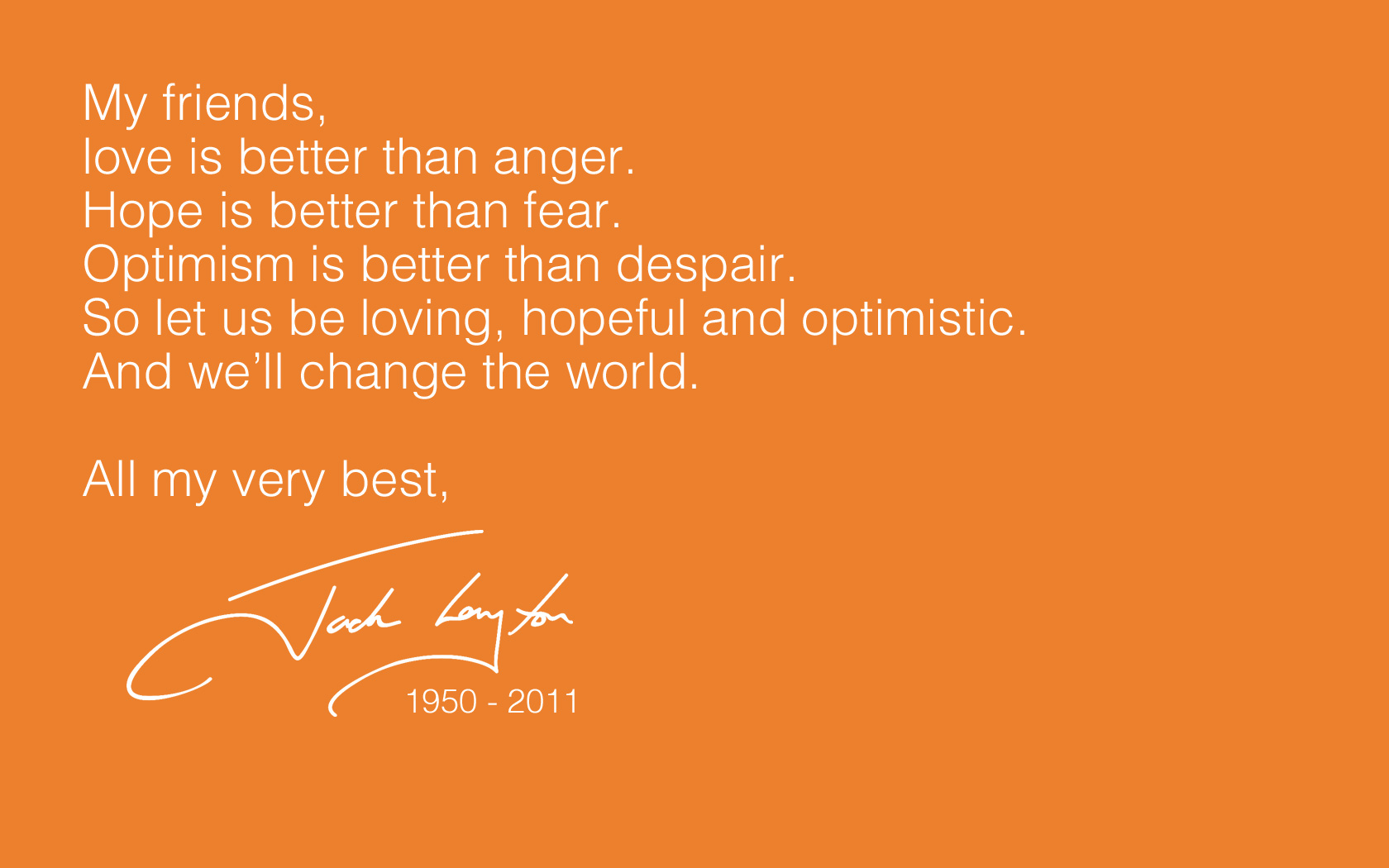
I miss him like crazy.
Jack Layton was the second politician to make an impact on me and my political views.
The first was Barack Obama.
I met Jack Layton at a campaign rally here in Winnipeg during the election of 2011. He was shorter than I'd expected but his charismatic energy filled the room so much that it didn't matter. I still caught myself catching my breath.
He talked about ideas that make sense, like inclusivity, combatting climate change, and true universal health care, and that were grounded in an unwavering belief that by working together we could achieve much more than we ever could by competing against one another.
The room was filled with young people and people of colour and it felt good to be among hundreds of others who believed, like Jack, and like me, that we all become better together.
During his speech Jack talked about being a Canadian Idealist. I didn't know what that was, so I looked it up later, and this is what I know:
Canadian Idealism is a philosophical belief founded on three principles:
1. The Enlightenment (capitalism) has suppressed culture in our society.
Culture is how we make sense of our values and beliefs as a society. We need to invest in preserving and promoting our culture because it's how our knowledge and historically inherited ideas are passed down through generations.
2. Philosophy must include a study of history.
We need to thoroughly understand and study history and see where we went wrong in order to keep from making the same mistakes. This is the only way to build towards a society that can balance the civic unity (aka, the common good) with individual freedom.
3. We achieve freedom through the ethical life of our community, not in spite of it.
By participating actively in our society, and by putting social systems in place where people feel empowered to thrive and pursue their goals, we can build a society that is truly free (aka, positive liberty).
Turns out, I'm a Canadian Idealist. Who knew.
At the end of his speech Jack stuck around to shake hands and take photos, and I snaked my way through the crowd and ohmygod somehow wound up right in front of him. I felt overwhelmed and slightly sick, like meeting your idol for the first time. I blurted out something dumb like:
"I really admire what you're doing and I believe in you."
And Jack Layton took my hand in both of his hands and looked me in the eye and said
"I believe in YOU. We're in this together, and we couldn't do this without you."
I get misty thinking about how empowered he made me feel in that moment, and clearly it made an impact on others, too:
That election cycle, thanks to his leadership, the New Democratic Party more than doubled their seats in the House of Commons, and the NDP became the Official Opposition party for the first time ever.
Everything felt hopeful. Sure, we hadn't quite given the Conservatives the boot (yet), but the Orange Crush had come and the tides appeared to be turning. Canada, finally, started to look like it may become the kind of country that 30.63% of Canadians just like me wanted to see.
(Remember that the Conservatives won with 39.62% of the vote - just an 8.99% difference.)
Then, too suddenly, Jack Layton announced that he'd been diagnosed with pancreatic cancer, and on August 22, 2011, he died.
I still can't believe he's gone.
He was a beacon for the kind of person we should strive to be, and is someone I try to model myself after when it comes to how I live my life and advocate for the things I believe in.
You could tell that he was one of those rare people who got into politics because he believed passionately in the need for positive change. Not just through the policies he pushed for, but because he lived and breathed his beliefs in everything he championed, and everything he did.
He founded The White Ribbon Campaign, a movement of men and boys working to end male violence against women and girls.
He was one of the early advocates in the fight against AIDS.
He championed same-sex marriage.
He installed solar panels and geothermal heating and cooling in his house.
He rode his bike everywhere.
Even in his death, he managed to inspire so many of us with his last words.
As he lay dying, all that he could think to do, after spending his whole life in the service of others, was to leave us with a message of hope, forgiveness, and unity.
I'm going to copy/paste it from the CBC website below because you should read it. We all should. We live in scary, divisive, and uncertain times and it's important to be reminded of the good that resides in all of us.
So let's pour one out for one of the kindest and most compassionate Canadians of all time, our good friend The Honourable Jack Layton, PC MSC
RIP Jack.
Canada could really use you right now.
----
August 20, 2011
Toronto, Ontario
Dear Friends,
Tens of thousands of Canadians have written to me in recent weeks to wish me well. I want to thank each and every one of you for your thoughtful, inspiring and often beautiful notes, cards and gifts. Your spirit and love have lit up my home, my spirit, and my determination.
Unfortunately my treatment has not worked out as I hoped. So I am giving this letter to my partner Olivia to share with you in the circumstance in which I cannot continue.
I recommend that Hull-Aylmer MP Nycole Turmel continue her work as our interim leader until a permanent successor is elected.
I recommend the party hold a leadership vote as early as possible in the New Year, on approximately the same timelines as in 2003, so that our new leader has ample time to reconsolidate our team, renew our party and our program, and move forward towards the next election.
A few additional thoughts:
To other Canadians who are on journeys to defeat cancer and to live their lives, I say this: please don’t be discouraged that my own journey hasn’t gone as well as I had hoped. You must not lose your own hope. Treatments and therapies have never been better in the face of this disease. You have every reason to be optimistic, determined, and focused on the future. My only other advice is to cherish every moment with those you love at every stage of your journey, as I have done this summer.
To the members of my party: we’ve done remarkable things together in the past eight years. It has been a privilege to lead the New Democratic Party and I am most grateful for your confidence, your support, and the endless hours of volunteer commitment you have devoted to our cause. There will be those who will try to persuade you to give up our cause. But that cause is much bigger than any one leader. Answer them by recommitting with energy and determination to our work. Remember our proud history of social justice, universal health care, public pensions and making sure no one is left behind. Let’s continue to move forward. Let’s demonstrate in everything we do in the four years before us that we are ready to serve our beloved Canada as its next government.
To the members of our parliamentary caucus: I have been privileged to work with each and every one of you. Our caucus meetings were always the highlight of my week. It has been my role to ask a great deal from you. And now I am going to do so again. Canadians will be closely watching you in the months to come. Colleagues, I know you will make the tens of thousands of members of our party proud of you by demonstrating the same seamless teamwork and solidarity that has earned us the confidence of millions of Canadians in the recent election.
To my fellow Quebecers: On May 2nd, you made an historic decision. You decided that the way to replace Canada’s Conservative federal government with something better was by working together in partnership with progressive-minded Canadians across the country. You made the right decision then; it is still the right decision today; and it will be the right decision right through to the next election, when we will succeed, together. You have elected a superb team of New Democrats to Parliament. They are going to be doing remarkable things in the years to come to make this country better for us all.
To young Canadians: All my life I have worked to make things better. Hope and optimism have defined my political career, and I continue to be hopeful and optimistic about Canada. Young people have been a great source of inspiration for me. I have met and talked with so many of you about your dreams, your frustrations, and your ideas for change. More and more, you are engaging in politics because you want to change things for the better. Many of you have placed your trust in our party. As my time in political life draws to a close I want to share with you my belief in your power to change this country and this world. There are great challenges before you, from the overwhelming nature of climate change to the unfairness of an economy that excludes so many from our collective wealth, and the changes necessary to build a more inclusive and generous Canada. I believe in you. Your energy, your vision, your passion for justice are exactly what this country needs today. You need to be at the heart of our economy, our political life, and our plans for the present and the future.
And finally, to all Canadians: Canada is a great country, one of the hopes of the world. We can be a better one – a country of greater equality, justice, and opportunity. We can build a prosperous economy and a society that shares its benefits more fairly. We can look after our seniors. We can offer better futures for our children. We can do our part to save the world’s environment. We can restore our good name in the world. We can do all of these things because we finally have a party system at the national level where there are real choices; where your vote matters; where working for change can actually bring about change. In the months and years to come, New Democrats will put a compelling new alternative to you. My colleagues in our party are an impressive, committed team. Give them a careful hearing; consider the alternatives; and consider that we can be a better, fairer, more equal country by working together. Don’t let them tell you it can’t be done.
My friends, love is better than anger. Hope is better than fear. Optimism is better than despair. So let us be loving, hopeful and optimistic. And we’ll change the world.
All my very best,
Jack Layton
Maybe we're not totally screwed
- by Alyson Shane
Lately I've been really into this guy called Pete Buttigieg.
Who goes by "Mayor Pete" most of the time because 1. before announcing that he was going to run for President he served as the Mayor of South Bend, Indiana and 2. because "Buttigieg" is one of the most unfortunate last names you could have in contemporary North American politics, I think.
I first heard about Mayor Pete on the Pod Save America podcast (which is one of the best no-bullshit political podcasts out there)
where I believe they were commenting on his last name
and how a religious, gay Millennial who was previously the mayor of a small town in a conservative midwestern state was running for President
which got me all fired up, let me tell you.
Then I listened to his interview and was really impressed by his direct approach, thoughtful comments, and his policies. Dude reminds me of Obama a bit.
Oh, and did I mention that he went to Harvard and Oxford and fought in the War in Afghanistan?
Then we watched the CNN town hall where he blew everyone away and was happy to see that not only can he string a nice couple of words together, but he can also do it in a way that makes you go
oh
that's just plain common sense
like, there's a climate crisis and we need to stop pretending there isn't
automation is coming for millions of jobs that will never come back
we need to re-think the definition of "work" to include things like caring for family
nobody should worry about having to go bankrupt if they get sick
and as he's explaining his views he keeps repeating "I'm part of the generation that has to deal with these issues," and it's SO REFRESHING to hear a Millennial stating facts and being listened to at a federal level, holy shit.
He's still a long shot candidate at the moment, but he's been getting tons of press and was in Esquire, and apparently his campaign raised over $600 K in the 24 hours since the CNN interview.
It's so refreshing to see young political leaders with a strong message
working hard to craft forward-thinking policies that connect with younger voters
and pushing the needle on issues like automation and environmentalism as key policies
if only we had a party who could do something like that here in Canada
The Portage and Main debate is an embarrassment to Winnipeg
- by Alyson Shane
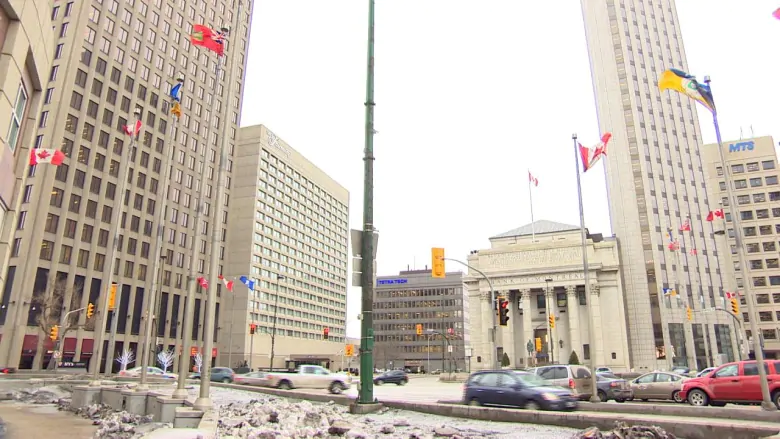
Image via CBC Manitoba
I've tried to stay out of this debate here on my blog. Though I have very strong political opinions I often find that it's easier (and more effective) to engage in conversations with people via social media where we can have an ongoing dialogue vs. writing it all out.
But today's news that there will be a referendum on whether or not we should reopen the intersection to pedestrians is pandering to the narrow-minded and defeatist attitudes that have plagued our city for far too long.
So today I want to provide some historical context for why we're in this mess, debunk some of the false facts being circulated by opponents of the project, and address some of the important moral issues associated with the way people view this issue that I don't think many arguing against the initiative have considered to date.
Some Quick Historical Context
Many people have cited "safety concerns" as the main reason for closing the intersection, which isn't quite true. As a CBC article recently reported, closing the intersection and funneling pedestrians underground was more of a "last ditch" effort to rejuvenate a dying downtown with a big infrastructure project than anything else.
One of the key points in the article reads: "Some of those decisions were based on the fact the city had just, in 1972, amalgamated with 13 surrounding municipalities to create a much larger metro centre."
I'd go as far as to say that the 'Unicity' decision of this time was the worst decision Winnipeg has made to date.
Allowing communities who have no vested interest in the well-being of Winnipeg's downtown, and who have continued to vote against urban development and renewal projects since the 70's, has been one of the primary factors in keeping Winnipeg from achieving true greatness as a city.
Why Some People Think Portage & Main Shouldn't Reopen
Below are a few "arguments" I've heard against reopening the intersection that I'd like to debunk before we go further:
"The intersection is unsafe and people will die!"
Not true. According to the 2016 Annual Collision Report from the City of Winnipeg, fatal collisions only made up 0.10% of all motor vehicle collisions that year. This means that of the 17,586 collisions that occurred that year, 18 were fatal. Of those 18 fatal collisions, only 6 (0.034%) occurred at intersections, and only 4 (0.022%) were with pedestrians.
So if we break down the data we can see that not only are pedestrians quite safe compared to people behind the wheel, but also that intersection-based collisions make up a tiny fraction of collisions and deaths due to motor vehicle accidents.
(For those interested, the overwhelming majority of motor vehicle accidents in 2016 - 39.71%, in fact - were from rear-ending someone. Slow down, people.)
So if this has been the argument you've been using, stop now because you're basing your opinion on false facts and data.
"Reopening will slow my commute!"
Also not true. According to a study issued on the topic, "50 percent of the automobiles passing through the intersection will be 'unaffected by the changes, with no difference in travel time.'"
According to that same report, if your commute is one that will be affected by the opening of the intersection you can expect to see a >50 second increase in your commute, on average.
So if you use this argument then it's time to admit that adding an average of two more minutes each day to your commute is more important than the overall health and well-being of the city you live in.
"The concourse should be good enough!"
Again, not true. Going underground and attempting to navigate the concourse is time-consuming and confusing, not just for city residents (myself included; I've gotten turned-around down there more than once) but for newcomers to the city and tourists, as well.
This argument also ignores the fact that while the concourse may be a passable option for able-bodied people, the same study found that it takes someone with a physical disability an average increase of 129% longer to travel the same distance as an able-bodied person.
If you use a wheelchair or scooter and need to take an elevator, you need to take a minimum of 4 elevators to get where you're going.
So if you use this argument then you need to take a long, hard look in the mirror and get okay with the fact that you're saying that 15.6% of our population (aka 145,270 people as of 2012) don't matter, or matter less than your car.
"Winnipeg isn't [insert city here]!"
No, it's not. Just like any city we have our challenges and hurdles, but the driving factor behind our sluggish growth and downtown rejuvenation is that we keep voting against urban development projects that are in our collective best interest.
So if this is the argument you're using then it's time to face the fact that if you actually want Winnipeg to be like any of these cities it's time to stop naysaying and take a proactive approach to how Winnipeg can be like the city you wish it was.
"This money would be better spent on roads!"
This is the single biggest argument Winnipeggers make against anything we disagree with because roads are something we interact with every day.
Here's the thing, though: Portage and Main are both roads, and the intersection plays an important role in the overall flow of traffic and infrastructure in our city.
This cycle of Drive, Repair, Repeat has gotten us nowhere in the last few decades, and by insisting that we prioritize roads and cars over everything else in our city we've allowed our downtown neighbourhoods to crumble and be neglected as a result.
Additionally, the City of Winnipeg spent a record amount this year on road repair and infrastructure projects outside this initiative. So if this is the argument you've been using, it's time to accept that you care more about the roads you drive on than the city you live in.
"Nobody cares about walking downtown, anyway!"
This is also untrue. Over 17,000 people live downtown as of 2015, and I'd wager a guess that these people would like to live in a place that feels walkable, accessible, and safe. After all, wouldn't you?
There are lots of books and studies that have proven that investing in pedestrian-friendly downtown cores are not only good for the people who live there, but that the cities benefit overall as a result.
Here are some stats to back that up:
- Fewer young people want cars. In 1995 people age 21 to 30 drove 21 percent of all miles driven in the U.S.; in 2009 it was 14 percent, despite consistent growth of the age group. Living car-free in walkable areas fits younger lifestyles. [Advertising Age, 2010]
- A one-point increase in Walk Score [based on number of destinations within a short distance] is associated with between a $700 and $3,000 increase in home values. [CEOs for Cities, 2009]
- A 10-point increase in Walk Score increases commercial property values by 5 percent to 8 percent. [University of Arizona & Indiana University, 2010]
- People living in walkable areas trust neighbors more, participate in community projects and volunteer more than in non-walkable areas. [University of New Hampshire, 2010]
- Pedestrian space designed to be accessible to all sidewalk users, including pregnant women and people with physical disabilities, is especially important because those with limited ability are not able to use other transportation options (U.S. Department of Transportation, 2001)
These stats illustrate why increasing pedestrian activity downtown and reimagining Portage and Main as a place for people, not just for cars, can play a pivotal role in bringing more people downtown and making our downtown communities like The Exchange District, Waterfront, South Portage, Chinatown, and the other surrounding areas that much more safer and desirable to live in.
So if this is your argument, and you don't already live downtown, then it's time to own up to the fact that you don't care about the health of the downtown core in the city you live in.
When Winnipeg Fails, We All Fail
It's time for some real talk: if you think Winnipeg sucks, it's because your attitude about it sucks.
I grew up here, and the common refrain I heard from everyone around me was: "Winnipeg is a dump and the best thing you can do for it is leave" which speaks volumes about us as its citizens.
After all, cities are a reflection of the values of the people who live there.
What do you think your attitude about Winnipeg says about you?
Dear Stephanie Wilkinson
- by Alyson Shane
Respect, girl.
It takes stones to ask the White House Press Secretary to leave your restaurant because her presence, and what she stands for
an administration that is systematically dismantling all of the progress that has been done in America over these last few generations
hates LGBTQ people
is racist and bigoted
promotes the kind of small-minded, partisan, xenophobic thinking that undoes the fabric of a national economy
undermines and attacks the CIA, FBI, and the Department of Justice
and works to systematically dismantle and disrupt global and unilateral organizations and treaties
rightfully made some of her staff upset. 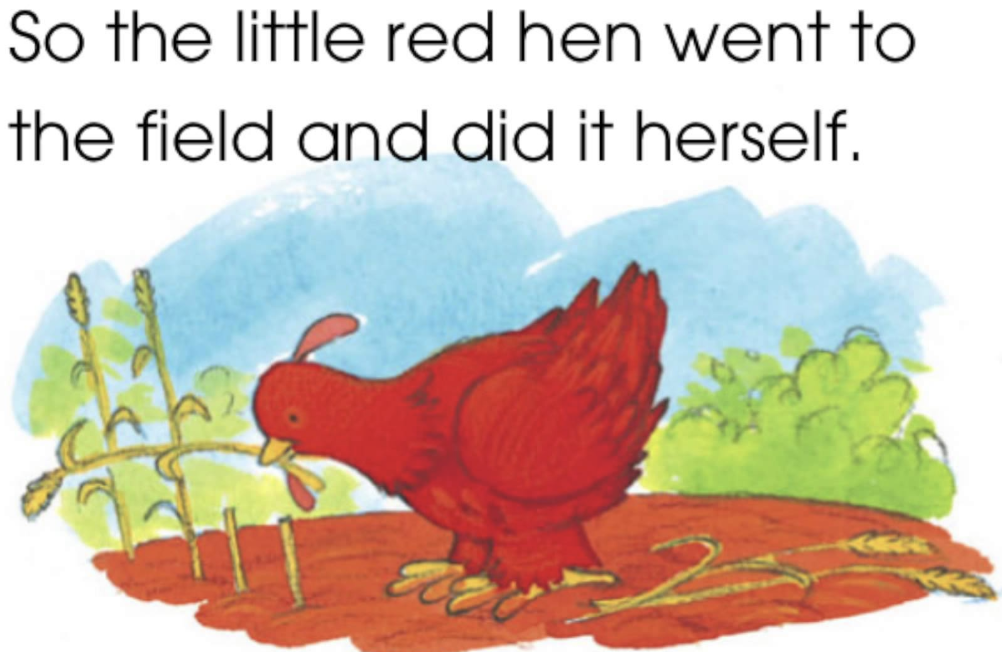
It must have been a tough decision because to be honest Trump supporters are scary. They're like rabid dogs and will bite you and try to pass on their poisonous hate to anyone and anything they can sink their teeth into.
Not to mention the fact that the person who is supposed to be in charge of running one of the largest and most influential countries on the planet
(okay, maybe not that part anymore since they're basically abandoning the rest of the world)
is so thin-skinned and uninterested in focusing on governing effectively that he'll weigh in on anything that gets his political base fired up.
If I were you, my heart would have been pounding as I walked up to that table. I can't imagine having to put myself and my business which employs other people at risk because a woman who thinks lying to the American people every day is just part of the job decided to stop by for a cheese board.
But I completely agree with your decision (especially since you have several gay people on staff who I'm sure were uncomfortable with her presence) and when you said:
“this feels like the moment in our democracy when people have to make uncomfortable actions and decisions to uphold their morals.”
Because we do. Maybe now more than ever.
And as business owners we have a responsibility to use our business to support and promote the values we believe in, even if that means taking a financial hit.
We're lucky enough to be in a position where we can channel our passions into something that adds to our communities and makes the world we live in a better place, and sometimes that means making hard decisions so we don't compromise our morals.
Stick to your guns, girl. You'll get through this.
And, for what it's worth, you just made me into a lifelong customer.
What We Can Learn About Personal Branding From Louise Linton's Instagram Fiasco
- by Alyson Shane
I'm not often one to bring together politics and my profession, but sometimes public lessons bear repeating.
This morning I was listening to the NPR Politics Podcast (which I high recommend for all you political wonks out there) and in the final section of their show they discuss stories they "can't let go." In the segment, Congressional reporter Susan Davis mentioned a fiasco involving the U.S. Treasury Secretary and his wife, Louise Linton.
Here's the story in a nutshell:
- The original post. Louise posted a photo on her Instagram account, which was public at the time but is now private, of herself and her husband disembarking from a government airplane (the photo has also now been deleted.)
- Humblebragging. The primary reason Louise came under fire was because she included several hashtags mentioning the multiple designer label items she was wearing. Commenters felt that she was bragging about her wealth and using a government plane.
- Feeding the trolls. One commenter left a comment which read: "Glad we could pay for your little getaway #deplorable" to which Louise responded with a comment where she claimed she and her husband were "bigger patriots" than the commenter (see below).
- Going viral. As a result of Louise's reaction to the comment, the story blew up all over news networks and drew a lot of attention from the media.
- Watchdogs get involved. The story viral highlighted the couple's trip on a government airplane, which let to the watchdog group Citizens for Responsibility and Ethics in Washington (CREW) filing a FOIA to investigate whether or not the couple planned the trip using the government plane specifically to get a good view of Monday's solar eclipse.
Breaking It Down
While Louise Linton's story isn't uncommon - lots of people say/do things online which acerbate a situation, after all - it's relevant because it's a pertinent example of how a mismanaged personal brand can have far-reaching negative consequences for the individual.
Let's explore in more detail:

The Original Post
Let's start with the facts: Louise Linton is married to a politician, which means that she is going to come under just as much fire and scrutiny as her husband. This is normal, but we live in times which are defined by the growing gap in inequality between the 1% and the poor, especially in the United States.
As a result, someone in her position needs to be especially careful about what she shares as she builds her personal brand, and the role that information plays in a larger narrative about herself and her husband, Republicans, and wealth inequality in America.
Obviously none of these thoughts were present when she posted her photo to Instagram. Honestly, the photo itself isn't terribly troublesome; it shows the couple walking off a government plane and looks like your typical "politicians going to and from places" photo that we've seen of basically every politician at some point in time.
The problem was that she used the post as an opportunity to showcase the variety of designer items she was wearing. By deliberately including these hashtags she went out of her way to flaunt her wealth, which doesn't bode well in a time when the income gap in America is as worse as it's ever been.
As a result, some people got upset.
The Fallout
Of the many comments left on the post, this one seemed to be particularly upsetting for Louise:

She responded with a lengthy, condescending comment which included the following excerpt:
“Cute! Aw!!! Did you think this was a personal trip?! Adorable! Do you think the US govt paid for our honeymoon or personal travel?! Lololol. Have you given more to the economy than me and my husband? Either as an individual earner in taxes OR in self sacrifice to your country?”

In the immortal words of Bianca DelRio: "Really, Queen?"
In addition to being incredibly condescending, Louise's comment strikes a few critical nerves here:
- She's deliberately dismissive of the commenter from the get-go.
- She flat-out denies that her trip was a personal one.*
- She insults the commenter by insinuating that she and her husband "give more" because they pay more in taxes... ostensibly because they earn more.
- She accuses the commenter of not being as patriotic as herself and her husband as a result of their tax contributions.
*(which has since turned out not to be completely true)
For someone who lives in the public eye, and who is married to a wealthy and influential politician whose effectiveness within government depends on his ability to identify with and relate to his electorate, this was about the worst possible comment she could have made.
In addition to breaking the number one rule of the internet (don't feed the trolls), her comment aggravated the situation because it clearly demonstrated that she thinks she doesn't see herself as someone who can relate to, or is even on the same playing field as, the people commenting on her photo. And this is probably true: if she can afford a Hermez scarf, Tom Ford sunglasses, and Valentino heels (among others) then she's clearly in a significantly different place than many of her followers.
However: that doesn't make it appropriate to point it out, especially in the way she did.
Coming Under Fire
The most fascinating aspect of this story was that her Instagram fight went viral, and wound up attracting the attention of the CREW watchdog group.
Now, because Louise didn't properly manage her personal brand, she and her husband are coming under fire for potentially using government aircraft for a personal excursion and are the subject of increased scrutiny and media coverage.
We often hear the expression There's no such thing as bad publicity, but in this case I'd be willing to bet that Louise wishes she'd never posted the photo at all. Primarily because she's since deleted the image and made her account Private.
Why Is Her Situation Different?
We live in the age of the Instagram influencers, and there are thousands (maybe more) of users who have built up followings, established relationships with brands, and build personal media empires based on using hashtags to establish influence and get in front of major retailers, agents, brand managers, and the like.
One could argue that, as a small-time actress, Louise was just trying to get in front of the brands she'd like to work with, and I'm inclined to agree that that's probably exactly what she was doing.
So what makes Louise's situation different? Simple: she's married to a politician.
This fact shifts the perception of her personal brand away from "small-time actor and budding influencer" to "politician's wife flaunting their wealth." It means that what she says and does is much more likely to come under fire, which means she needs to be extra-mindful of how she presents herself and her lifestyle online.
When building our personal brands we need to be mindful of the ways in which others will perceive what we post, say, and do. Of course, we can't please everyone all the time, but part of developing a strong personal brand is identifying our positive strengths, showcasing our passions, and doing our best to be a supportive and inclusive member of whichever communities we're a part of.
Louise Linton's Instagram post did none of those things, and by engaging in a comment fight she further undermined any credibility she may have had by demonstrating that she saw herself as being on a pedestal compared to the average American.
What Can We Learn?
Louise Linton's Instagram fiasco can be summed up in a few key points which should be seared into the minds of anyone attempting to build a personal brand:
- Like Kendrick Lamar says: Be humble. Part of building an effective personal brand is telling a story of growth and progress, so sharing success stories, collaborations, unique opportunities and experiences, and the like is often part of that process. But going out of your way to publicly flaunt your wealth is never cool or relatable; in fact, it's usually the opposite.
- Think before you post. We're all guilty of posting dumb stuff from time to time, but the larger our personal brands become, the more we need to think critically about what we say and do, and how it may make others feel.
- Ask yourself: who will connect with this content? Louise Linton is a politician's wife, which means the majority of the people who engage with her content are either people who like or dislike her husband and what he represents to them. Even if Louise's primary goal with her content was to get in front of designer brands and high-end influencers, she should have been more aware that the majority of people paying attention to what she's doing are people who can't afford to wear multiple designer pieces to take a ride on an airplane, which is going to garner more negative feedback than positive.
- Don't feed the trolls. Just don't do it.
- If you *absolutely have to comment back*, again: be humble. Apologize. Play nice and be civil. We win more friends with honey than with vinegar, after all, and if Louise had just apologized or been more demure in her response the public fallout, media coverage, and subsequent CREW involvement may never have happened.
At the end of the day, building a strong personal brand doesn't happen overnight, and it takes concerted effort to continue to build momentum and share content which resonates with your audience and projects the best version of yourself forward.
There are lots of ways you can connect with your target audience, get in front of brands and labels, and establish yourself as an influencer in your niche.
Just try not to take the Louise Linton approach when you do.
Do you have any personal branding horror stories, or suggestions for what Louise could have done instead? Tweet at me or tell me in the comments!
Why We Need Twitter (or Something Like It) More Than Ever
- by Alyson Shane
For myself, and many people that I know, the world feels like an unfamiliar place right now.
The recent election of Donald Trump in the United States, and the apparent rise of white nationalism, anti-feminism, Islamophobia, homophobia, antisemitism, etc. (also known as the "alt right") has many people feeling scared and confused, and a lot of articles, from WIRED to Mashable, have emerged recently about the "echo chamber" that social media, particularly Facebook, has created which has led us to where we are today.
With that in mind, I wanted to discuss some of the ways in which I believe Twitter is actually getting things right in terms of providing a non-insular opportunity for people to express themselves, easily find dissenting viewpoints, and engage with them in conversation.

Before we begin
I know that there are a lot of dissenting views out there about Twitter, and it's usefulness as a social platform. Before I go too much further, let me get these things out of the way:
- Yes, I know that their CEO is wildly unpopular
- Yes, I know they have had issues addressing harassment and hate speech in the past
- Yes, I know that their value has tanked
- Yes, I know they have issues acquiring new users
This post isn't about any of those things.
What I'd like to do is discuss some of the things that make Twitter an important and necessary platform for our society right now, and how it (or something with the features I'm going to highlight) must continue to offer in order to allow for citizen journalism, the sharing of thoughts and ideas, and discussion online.
Hashtags (that people really use)
This morning I got up and read (on Twitter) that the cast of the Broadway musical Hamilton delivered a speech to United States vice-president elect Mike Pence at the end of their show last night. Within a few hours, right-leaning Twitter users took to the social network to start pushing a hashtag called #BoycottHamilton, urging (rather obviously) Trump supporters to boycott the play.
The fact that a hashtag emerged isn't what's important, but what you see when you click on the hashtag is:
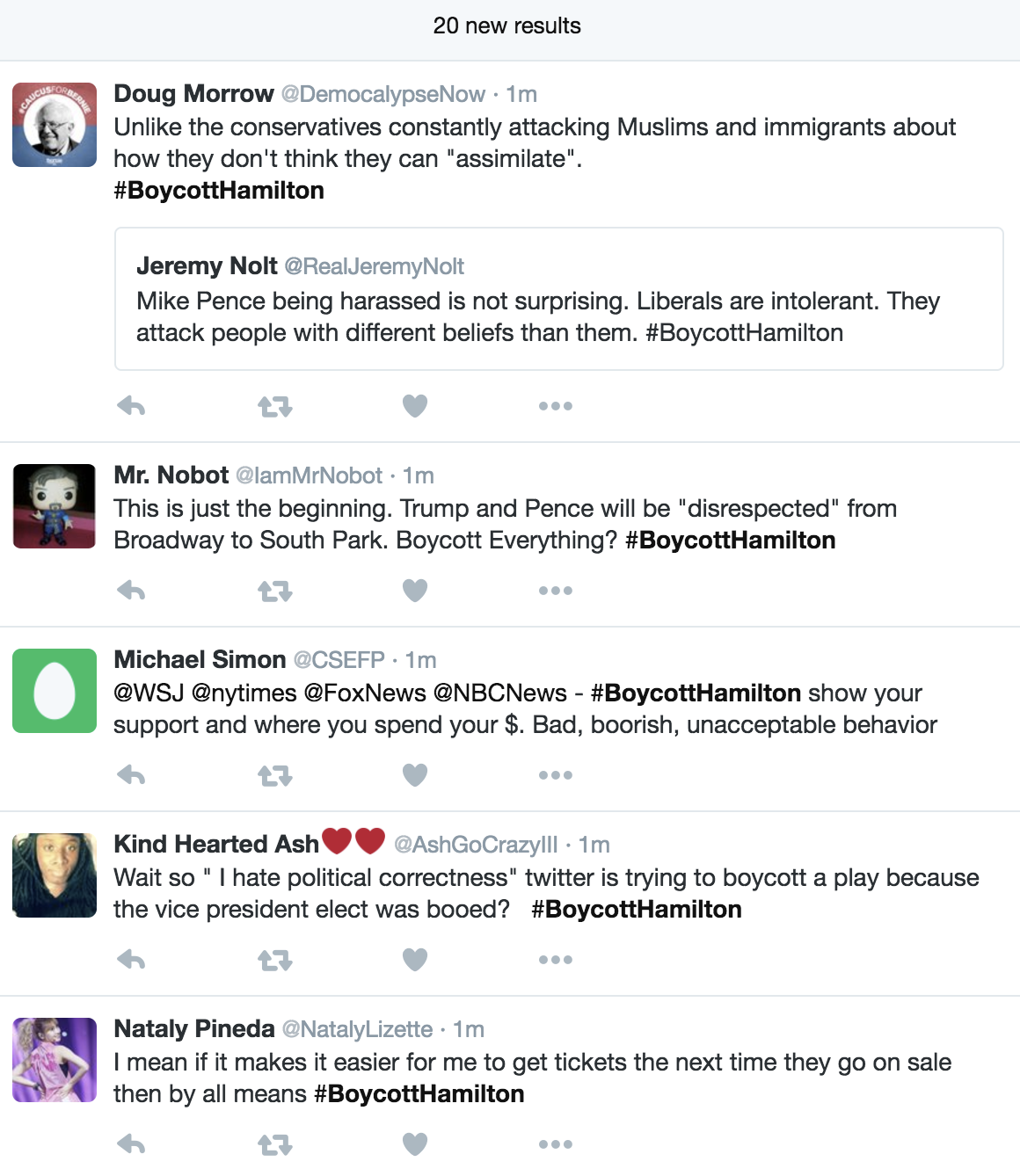
Even in this single snapshot we see a series of diverse opinions. Some don't take it seriously, some are worked up, etc. Not only does a timeline around a hashtag display diverse opinions, but Twitter also offers you this added level of engagement with a hashtag's tweets:
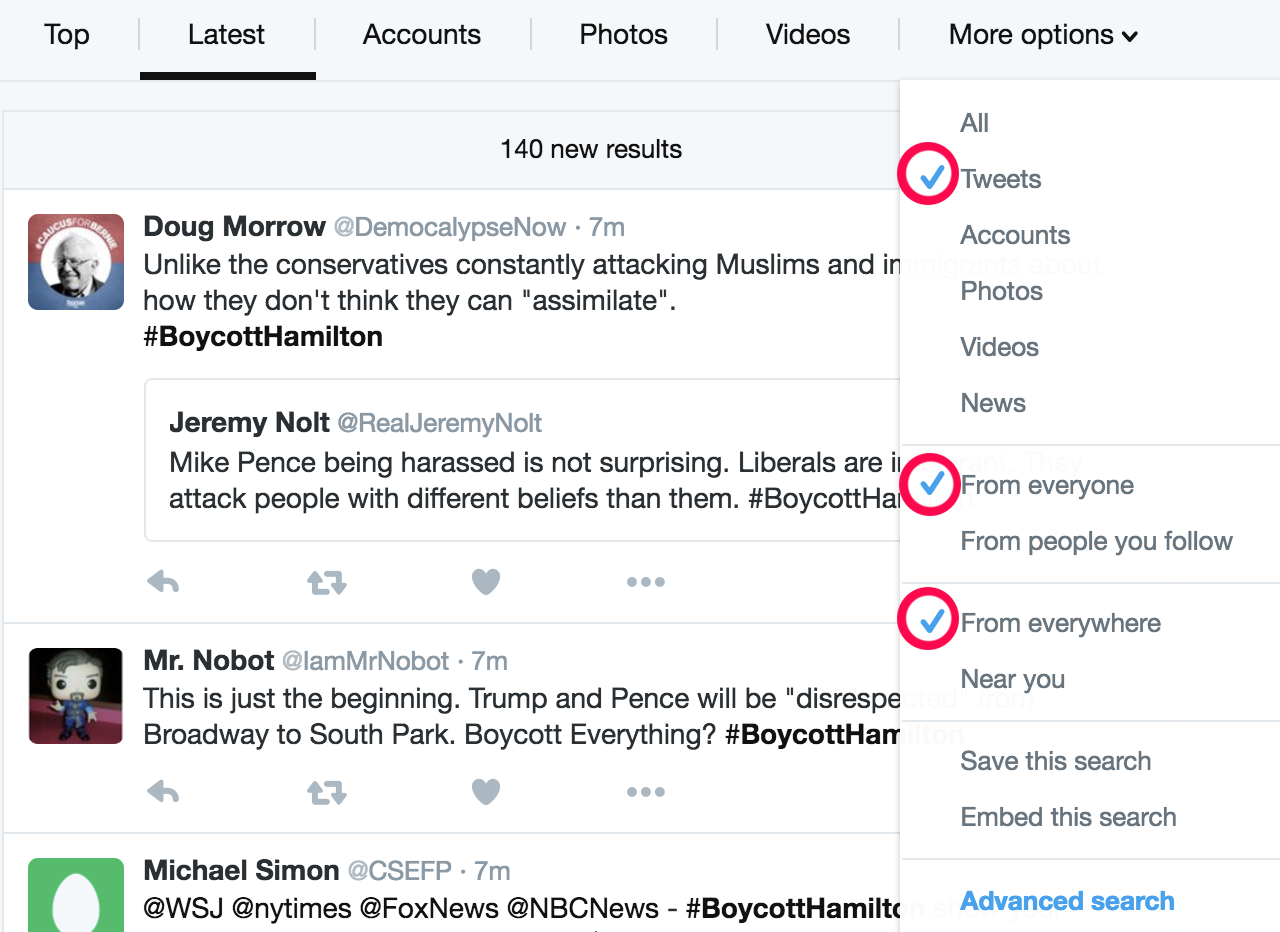
These settings are on by default. This means that in order to find yourself inside a Twitter echo chamber, you literally have to take the necessary steps to insulate yourself against opposing viewpoints.
Compare this to Facebook, which deliberately shows you news items and articles that appeal to you and goes out of their way to make changing those settings a challenge. Yes, hashtags are available to use on Facebook, but according to a 2016 BuzzSumo report, posts without hashtags received more interaction than posts with hashtags. This means that not only are hashtags not popular in Facebook, but that including a hashtag in your post actually lowers the likelihood that someone will engage with it.
So not only is Facebook pushing appealing news at you, but the primary tool at your disposal to find dissenting voices (a hashtag) are rarely used. This means that in order to find different opinions you either need to already be Facebook Friends with someone who disagrees with you, or you have to already subscribe to a Facebook Page or Group where you're likely to hear dissenting views.
But even in that scenario, you still have to actively seek it out, Like, and in some cases apply to join, a Group or Page which espouses views that you disagree with. Then, once you start expressing your opposing viewpoints you encounter the next hurdle: the wall of text. Which brings me to my next point:
Character and post length
Algorithms aside, one of the biggest differences when it comes to hearing opposing viewpoints online, and actually paying attention to them, is that Twitter forces you to be brief, at least in the context of a single tweet.
On Facebook there's no character limit, which means people can (and do) go on ad nauseam to explain their point of view. There's nothing inherently wrong with this, but it highlights the difference that Twitter acts like a conversation, while Facebook acts like a soapbox.
Being on the receiving end of a "Twitter storm" sucks; I can tell you from experience. But it's much easier to process and digest someone else's point of view in 140 characters than digesting (and responding to) several massive paragraphs (or, if you're unlucky, a single monolithic wall of text.)
Tweets, for all their faults, force people to break up their thought process, which provides opportunities for others to interject, respond, and get involved without having to unpack multiple paragraphs of text. I've engaged in debates with people on Twitter over a specific hashtag and more often than not both sides receive support from people who happened to see the conversation, and wanted to participate.
On the flip side, Facebook allows comments to be up to 63,206 characters in length, according to a 2016 HubSpot article. To put that into context: the average book is approximately 500,000 characters, meaning you can fit an entire novel in 9 Facebook status updates.
Just because tweets are shorter doesn't mean that they won't get ignored, or fluffed off, but when a Facebook user replies with a wall of text, a common sign of trolling, it's much easier to dismiss or simply ignore it.
Encouraging conversations
One of the points that I made earlier was about hashtags, and how searching for a hashtag meant that you could easily find differing opinions. It's also important to note that including a hashtag in your tweets also means that other people can easily find you.
Tweeting about a topic like #BlackLivesMatter, #Election2016 or #MAGA (to name just a few) will not only bring like-minded users out of the woodwork, but it's almost guaranteed that someone from the other side of the political spectrum will tweet back at you.
Tweets which include hashtags are 33% more likely to get retweeted than those that don't use them, and this (somewhat older) article from Sysomos which examined over 1.2 billion tweets in two months, which states that "29% of all tweets produced a reaction - a reply or a retweet. Of this group of tweets, 19.3% were retweets and the rest replies."
This 2016 report found that Twitter accounts for 30% of all global social sharing. At 500 million tweets sent each day (or 6,000 tweets every second), that's a lot of replies and retweets, even if Sysomos' 2010 numbers haven't grown since the article was published.
Not only does voicing your opinion on Twitter increase your chances of interacting with someone who disagrees with you, but when a discussion is retweeted, its visibility becomes amplified too. As more users participate, it increases the likelihood that you will run into someone who disagrees with you even more.
Default "public" profiles
Transparency is, in my opinion, the defining feature which makes Twitter such a powerful tool for discussion: when you tweet at someone your reply is completely public.
Unless you go out of your way to change your Twitter profile to "private," your entire tweet history including replies, retweets, quotes, and media will be available for any one whether they are logged in to Twitter or not. And if a tweet is retweeted, even deleting it later won't delete the retweet copy.
Facebook, conversely, was designed to be a more exclusive experience. From day one Facebook's defining feature has been a user's ability to selectively choose who can see what they share, and, for the most part anyway, the conversations you are able to have are limited to the amount of Facebook Friends you've approved, or the number of Groups or Pages you Like or participate in.
While the average Facebook user's Timeline isn't completely private (posts which tag other users, for example, will show up unless otherwise specified) and their comments may be seen if another user's privacy settings are more lax, overall what you say on Facebook isn't immediately available to the public in the same way that Twitter's Timelines are.
Yes, people are can be "outed" if they say something that another user disagrees with, but unless the person is a celebrity, political figure, or person of interest, the average user isn't going to re-share a hateful comment their coworker made and say "I never realized that so-and-so in Accounting was such an antisemite!"
We just don't call each other out in that way on Facebook at a personal level, and on Twitter, we don't really need to, because whatever a user posts is readily available to the world at large.
Easy access to a variety of opinions
Until recently, when we examined a specific historical event or time we had a limited number of sources to draw from. Nowadays, social media allows us to look into the life of the average person and experience, sometimes in real time, what they are experiencing.
Probably the most memorable of these incidents was the Twitter coverage of the protests over the 2009 Iranian election. Foreign media had been banned from reporting, and the stream of live coverage from everyday citizens on the ground led to a request from the U.S. State Department to put off scheduled maintenance which would have caused an outage in Iran during the protests.
Twitter provided the world with access to real-time information about a national crisis, and ever since has become the go-to source for breaking news including weather, political uprisings, and more. But it does more than just give us "on the ground" access to important events; it allows for public scrutiny of the facts, so that while false information will still get around, corrections have the chance of spreading in realtime too.
By using hashtags to discuss a common theme or event, Twitter users are able to contribute to a global and multi-faceted real-time narrative about what's happening in the world that they live in. Clicking on the hashtag they're using will show them a diverse array of opinions on the topic.
Here's another screenshot of some of the 'Live' #BoycottHamilton tweets:
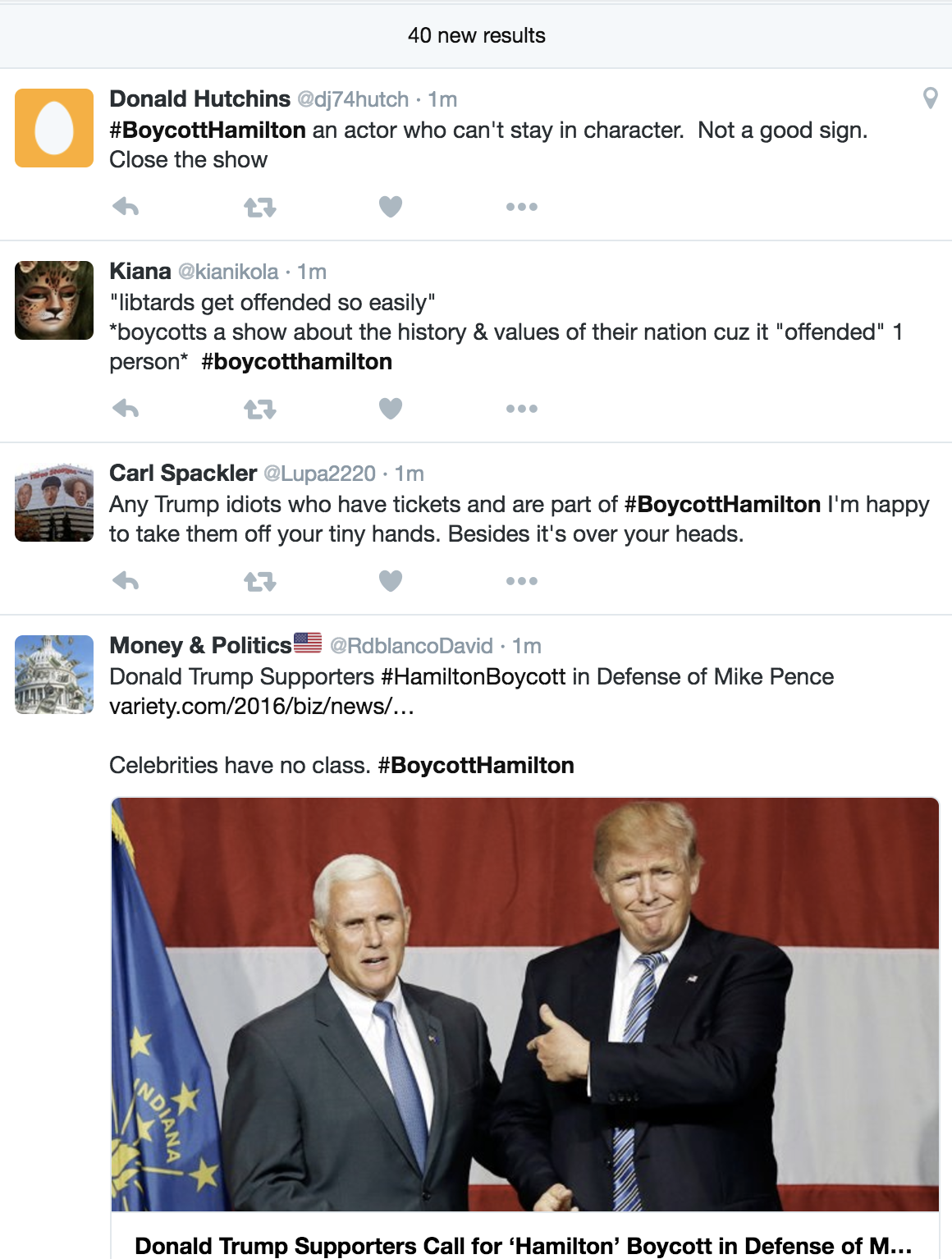
In closing
To be clear: I don't think that Twitter is the perfect platform. It has its share of flaws and issues, and eventually something will come along to replace it (hence the title of this post).
However, I do think that it's important to discuss the elements of the social network which I think make it good, and relevant. Twitter is an important tool for discussion and news, and provides more opportunities for users to engage with people outside of their "echo chamber."
Now, more than ever it seems, we need to be able to hear what other people have to say.
Here is a list of things overheard at The King's Head last night
- by admin
which is where John, Will and I found ourselves during the #wpg14 #yourmayor debate.
Me, calling Gord Steeves a tool.
Will, talking about his super interesting video project which I won't talk about in detail here.
John, being clever and cute as usual.
Our waitress apologizing for serving me a 'Lil Scrapper instead of a Bulldog (it's all good, girl!)
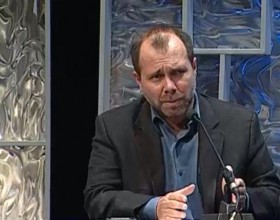
The dude from Shaw TV asking everyone if they had questions for the candidates. Over and over.
The girls at the next table commenting on how unimpressed Bartley Kives looked throughout the entire debate.
Dudes a few tables over talking about hockey.
People reading their Twitter streams aloud.
And basically everything except the actual debate, which was why we were there in the first place.
Damn.
Cyclist of the Day
- by admin
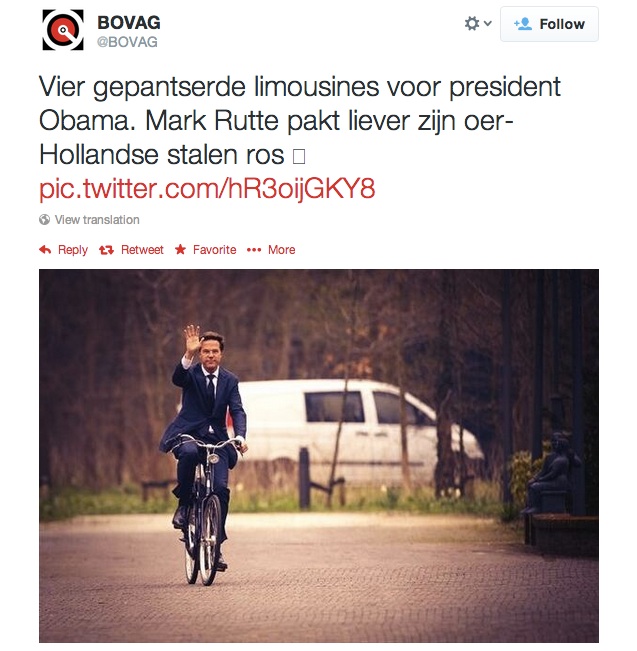
Dutch PM Mark Rutte, who apparently showed up for his meeting with President Obama on a bike and is my personal hero.
From Google Translate: Four armored limousines for President Obama. Mark Rutte addresses are rather typical Dutch steel horse

